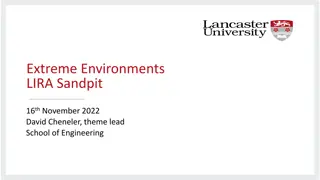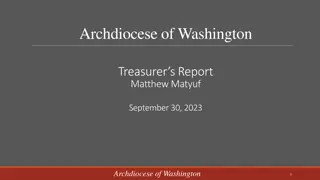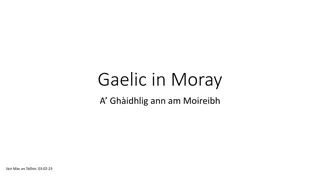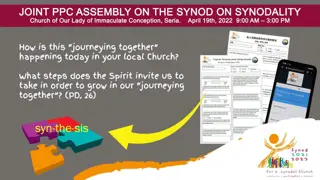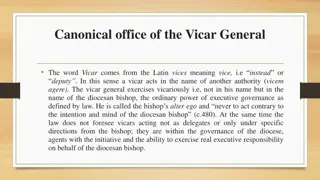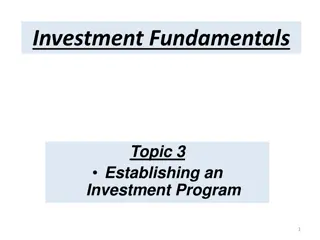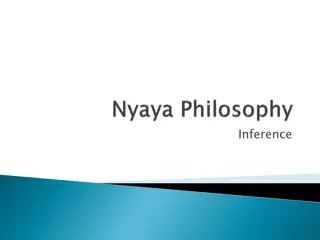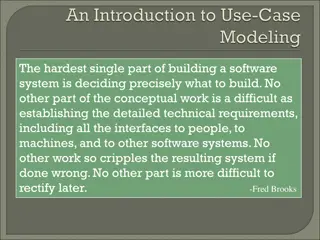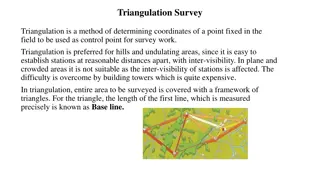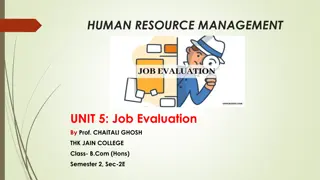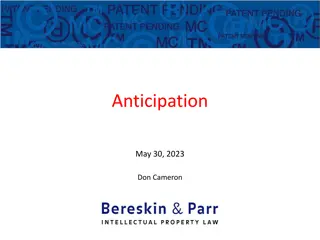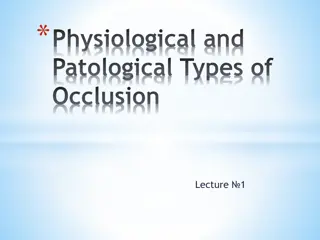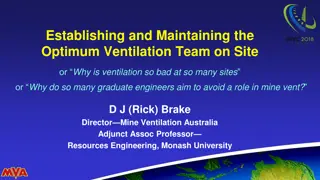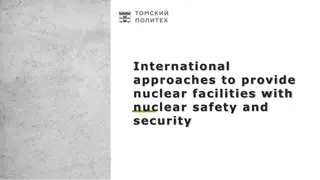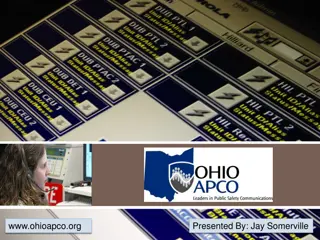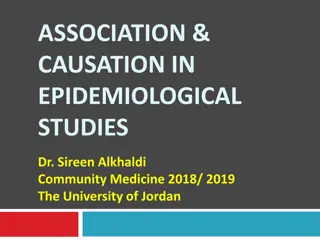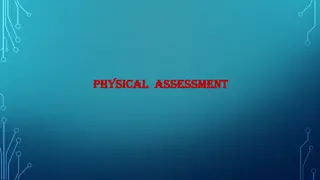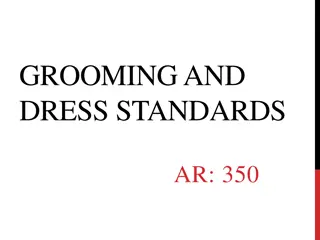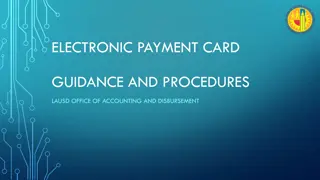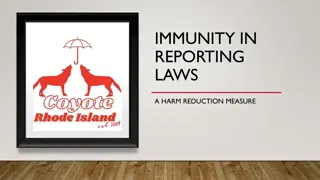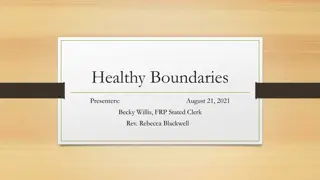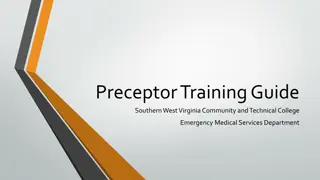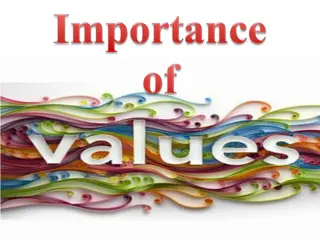The Importance of Establishing New Parishes in Lira Diocese
Highlighting the practical reasons for establishing new parishes in Lira Diocese, the content emphasizes the need for economic stability within communities to sustain new missions. It discusses the nature of a parish as a vital part of the diocese, emphasizing unity and collaboration with the bishop. Exploring the essence of a parish as a community of the faithful and the center for shared faith and communion, it underscores the significance of the parish in the Christian journey.
Download Presentation

Please find below an Image/Link to download the presentation.
The content on the website is provided AS IS for your information and personal use only. It may not be sold, licensed, or shared on other websites without obtaining consent from the author. Download presentation by click this link. If you encounter any issues during the download, it is possible that the publisher has removed the file from their server.
E N D
Presentation Transcript
A CASE FOR THE ESTABLISHMENT OF NEW PARISHES IN LIRA DIOCESE The diocese is divided into, deaneries, parishes, chapels and Christian communities. It is the most Practical structure to influence development at all levels. Lira diocese has now 22 parishes, however this remain too large and wide.
There is need for opening up new parishes. The question raised always is can the community sustain the priests? It seems there is a realization that, the new parishes must be opened based on the economic stability of the people to sustain the mission. This could have arisen from the experience of the already established parishes which are also in financial crisis. Most Parishes, if not all do not have any financial plan to run their activities.
The parish is not of divine right, nor a primitive institution. The dioceses came to be divided in to parishes for practical reasons in order to enable the bishop to fulfil their practical mission more effectively. The parish is merely a sector of the diocese, not a self-contained entity. It has a certain unity and totality, but is the totality of a cell, and its vitality depends on its union with the diocese. The parish priests are not little Bishops, but collaborators of the bishop, who is in the full sense, the pastor of the local church; thus it is from him, not from the parish priest, that the laity receive their apostolic mission. If the principles are forgotten the parish becomes closed upon itself, introverted, parochialmind . Cardinal Gracias
What is a Parish A parish is a community of the Christian faithful stably constituted in a particular church, whose pastoral care is entrusted to a pastor under the authority of the diocesan bishop (c. 515 1). The parish is not principally a structure, a territory, a building, but the family of God, fellowship afire with a unifying spirit, a familial and welcoming home, the community of the faithful. People do not simply belong to the parish. They are the parish. It is a sign of the Church s visibility and a home where communion among all the members of the community is expressed. The ecclesial community knows no boundaries of race, language or culture.
What is a Parish It is Christ who tears down the walls that separate individual from individual, family from family. The parish is the community of the faithful because one is not a Christian by oneself. To be a Christian means to believe and to live one s faith together with others, to be Church, to be community. The Christian community born of the word has as its center and summit the celebration of the Eucharist. Through the Eucharist it roots itself in the mystery of the Paschal Christ and, through him, in the very communion of the three divine Persons.
Evaluation of a Parish The parish priest must frequently examine to see whether his parish is a community. Are the sick tended? Are the poor fed and clothed? Are the illiterate educated? Are the widows and orphans looked after? Is the faithful being taught to various groups in ways that they can understand and assimilate? Are the lonely being absorbed into the community life? Is every Christian being challenged to grow everyday in Christian commitment? In short, is the celebration of the Eucharist bringing about living Eucharistic community that is visibly and tangibly characterized by care and concern?
Competent Authority to Establish a Parish The diocesan bishop alone can establish, suppress or alter parishes. He is not to establish, suppress or notably alter them unless he has consulted the council of priests (c. 515 1).
Types of Parishes As a general rule, a parish is to be territorial, that is, it is to embrace all Church s faithful of a given territory. Where it is useful, however, personal parishes are to be established, determined by reason of the rite, language or nationality of the faithful of a certain territory, or some other basis (c. 518; also c. 383 , c. 813). A quasi-parish/ sub- Parish is a community of Christ s faithful within a particular Church, entrusted to a priest as its proper pastor, but because of special circumstances not yet established as a parish (c. 516 1). Where some communities cannot be established as parishes or quasi-parishes, the diocesan bishop is to provide for spiritual care in some other way (c. 516 2). For example a priest may be appointed by the bishop to be in charge of a sub-station of a parish or in charge of migrant camps, airport oratories, prisons, hospitals.
Basic Christian Communities/ OTEM Basic Christian Communities are small groups of Christians who come together within the Church so that they be closely united with her and contribute to her development. Everybody should feel that the Church is a home and family for everyone. Basic Christian Communities are an effective way of promoting communion and participation in parishes and dioceses and a genuine force for evangelization. These small groups help the faithful to live as believing, praying and loving communities like the early Christians (cf. Acts 2:44-47; 4: 32-35).
Basic Christian Communities/OTEM They aim to help their members to live the gospel in a spirit of fraternal love and service, and are therefore a solid starting point for building a new society, the expression of evangelization of love. The marks of the Basic Christian Communities are: 1) Members of Basic Christian Communities are neighbors. 2) Basic Christian Communities make gospel sharing basis of their meeting
Basic Christian Communities/ OTEM 1) Basic Christian Communities act and do things together out of faith. 2) Basic Christian Communities have to be linked to the particular and universal Church. Basic Christian (ecclesial) Communities are a sign of the Church s vitality.
Basic Christian Communities/ OTEM The Disciples of Christ gather together in them so as to hear the Word of God, to develop fraternal bonds, to celebrate the Christian mysteries in their lives and to assume responsibility for transforming society. In addition to this specifically Christian concerns other important human values emerges: friendship, personal recognition, a spirit of co-responsibility, creativity, vocational response, concern for the problems of the world and of the Church. From them, an enriched community experience can result, a true expression of communion and a means for the construction of a more profound communion. To be authentic, every community must live in union with the particular and universal Church, in heartfelt communion with the Church s Pastors and Magisterium, with a commitment to missionary outreach and without yielding to isolationism and ideological exploitation.
The Parish Priest/Pastor The parish priest is the proper pastor of the parish entrusted to him. He exercises the pastoral care of the community entrusted to him under the authority of the diocesan Bishop, whose ministry of Christ he is called to share, so that for this community he may carry out the offices of the teaching, sanctifying and ruling with the cooperation of other priests or deacons and with the assistance of lay members of Christ s faithful in accordance with the law (c. 519). A parish priest is to have the parochial care of one parish only. However, because of the shortage of priests or other circumstances, the care of a number of neighboring parishes can be entrusted to the one parish priest (c. 525 1).
The Parish Priest/Pastor Parish Entrusted to a Team of Priests The pastoral care of one or more parishes can also be entrusted to a team of priests but one of the team should be appointed as the moderator. The moderator directs the combined activities of the team and is responsible to the bishop (c. 517 1).
The Parish Priest/Pastor Parish Entrusted to a Deacon or Some Other Person who is not a Priest or to a Community of Persons The diocesan Bishop because of the shortage of priests can entrust a parish to a deacon or some other person who is not a priest or to a community of persons provided he appoints a priest who will direct the pastoral care. Such a priest is like any other parish priest with the powers and faculties of a parish priest (c. 517 2).
The Parish Priest/Pastor Parish Entrusted to Clerical Religious Institute or to a Clerical Society of Apostolic Life The diocesan Bishop, but not diocesan administrator, can with the consent of the competent Superior, entrust a parish to a clerical institute or to a clerical society of apostolic life. (c. 520 1). This entrustment may be either in perpetuity or for a specified time. In either case this is to be done by means of a written agreement made between the diocesan Bishop and the competent Superior of the institute or society,. This agreement must expressly and accurately, define, among other things, the work to be done, the person to be assigned to it and the financial arrangements c. 520 2). The entrustment of a parish is made not to a particular religious but to an institute. The community of the faithful, which is established as a parish will profit very much from the presence of the religious among them. The religious clergy are not there to replace the secular clergy. They are there to enrich the diocese. As no person, no institute can fully incarnate the perfection of Jesus Christ, so the secular clergy alone will not be able to incarnate fully the multiform riches of Jesus Christ.
The Parish Priest/Pastor Qualities of a Parish Priest To be validly appointed a parish priest, one must be in the sacred order of priesthood (c. 512 1). He is also to be of sound doctrine and uprightness of character, endowed with zeal for souls and other virtues, and possessed of those qualities which by universal or particular law are required for the care of the parish in question (c. 512 2).
The Parish Priest/Pastor Appointment of a Parish Priest Appointment to the office of parish priest belongs to the diocesan Bishop, who is free to confer it on whomsoever he wishes, unless someone else has a right of presentation or election (c. 523). If the priest belongs to a religious institute or society of apostolic life, he is appointed by the diocesan Bishop on presentation by, or at least with the consent, of the competent Superior (c. 628 1; c. 738 2). In order that one be appointed to the office of parish priest, his suitability must be clearly established, in a manner determined by the diocesan Bishop, even by examination (c. 521 3).
The Parish Priest/Pastor Before the appointment of a parish priest, the diocesan Bishop must consult the Vicar forane /Deans, conduct suitable enquiries and if it is appropriate, the view of some priests and lay members of Christ s faithful (c. 524). The diocesan Bishop should appoint a parish priest for an indeterminate period of time unless the episcopal Conference has by decree allowed that he may be appointed for a specific period of time (c. 522). ( 5 years/ Renewable once in the same Parish). Limited term of office has the advantage of providing new leadership and of preventing certain stagnation. However the term of office should not be too short. A six year term for a pastor seems to be alright. Too short a term would prevent the pastor from knowing his people well and from
The Parish Priest/Pastor The particular law in Lira Diocese expressed in the pastoral directory declared that in the choice of a parish priest, the whole clergy have to express their opinion. This opinion would regard the suitability of the candidate. The directory affirms that, the appointment is done at the discretion of the diocesan bishop, with the good of souls as the fundamental criteria for the choice of the parish priest. Notwithstanding the qualifications required by universal law in the appointment of a parish priest, it is required that, he must be a cooperator of the bishop expressed through sincere charity and obedience. He is to be a man of dialogue and a man who knows how to stir up collaboration. This collaboration with the bishop is concretely expressed by notifying the bishop of new apostolic activities which circumstances might suggest. ( Pastoral Directory, 21 February, 1973 710 )
The Parish Priest/Pastor The current practice in Lira Diocese has been to consult the college of consultors in the appointments; this could have arisen from the practical difficulty in consulting the whole clergy in certain situations. The directory is not specific on how this opinion is to be expressed, since all the clergy are to express their opinion. The term clergy in practice seems to be used in a restrictive way, excluding the deacons, which in the universal law are clerics too. It would be practically difficult to obtain the opinion of the whole clergy especially when the number is big.
The Parish Priest/Pastor Cessation of the Office of the Parish Priest Removal: When the ministry of any parish priest has for some reason become harmful or at least ineffective, even though this occurs without any serious fault on his part, he can be removed from the parish by the diocesan Bishop observing the procedure for the removal of parish priests (c. 537 1; c. 1740-147). Transfer: The good of souls or the necessity or advantage of the Church may demand that a parish priest be transferred from his own parish, which he governs satisfactorily, to another parish or another office. In these circumstances, the Bishop can transfer him observing the procedure for the transfer of Parish Priests (c. 538 1; 1748-1752). The Case of Religious: A parish priest who is a member of a religious institute or
ASSISTANT PARISH PRIEST/ CURATES Whenever it is necessary or opportune for the due pastoral care of the parish, one or more assistant priests can be joined with the parish priest. As co-operators with the parish priest and sharers in his concern, they are, by common counsel and effort, with the parish priest and under his authority, to labor in the pastoral ministry c. 545 1).
ASSISTANT PARISH PRIEST/ CURATES An assistant priest may be appointed either to help in exercising the entire pastoral ministry, whether in the whole parish or in a part of it for a particular group of the faithful within it, or even to help in carrying out a specific ministry in a number of parishes at the same time (c. 545 2). To be validly appointed an assistant priest, one must be in the sacred order of priesthood (c. 546). Assistant parish priests who are members of a religious institute or a clerical society of apostolic life are appointed by the diocesan Bishop on presentation by, or at least with the consent of the competent Superior of the institute or society (c. 547; 682 1; 738 2). Other assistant parish priests are freely appointed by the diocesan Bishop. If he judged it opportune, he will have consulted the parish priest or parish priests of the parishes to which the assistant is appointed, and the Vicar forane (c. 547).
ASSISTANT PARISH PRIEST/ CURATES The assistant parish priest does not have the obligation to apply the Mass for the people (c. 548 2); otherwise has similar obligations as the parish priest. He should regularly consult him so that together they may provide for the pastoral care of the parish for which they are responsible (c. 548 3). The assistant parish priest is bound to reside in the parish or, if he is appointed for a number of parishes at the same time in one of them. For a just reason, however, the local Ordinary may permit him to reside elsewhere, especially in house common to several priests, provided the carrying out of the pastoral duties does not in any way suffer thereby (c. 550 1). The local Ordinary is to see to it that, where it is possible, some manner of common life in the parochial house be encouraged between the parish priest and the assistants ( c. 550 2). As far as holidays are concerned, the assistant priest has the same rights as the parish priest (c. 550 3).
Vacancy of the Parish When a parish is vacant or when the parish priest is prevented from exercising his pastoral office in the parish by reason of imprisonment, exile or banishment, or by reason of incapacity or ill health or some other cause, the diocesan Bishop is as soon as possible to appoint a priest to take the place of parish priest. He is called the parochial Administrator (c. 539). The parochial administrator is bound by the same obligations and has the same rights as a parish priest, unless the diocesan Bishop prescribes otherwise (c. 540 1). The parochial Administrator may not do anything which could prejudice the rights of the parish priest or could do harm to parochial property (c. 540 2). When he has discharged his office, the parochial Administrator is to give an account to the parish priest (c. 540 3).
Vacancy of the Parish When a parish is vacant, or when the parish priest is impeded from exercising his pastoral office, pending the appointment of a parochial Administrator the interim governance of the parish is to be undertaken by the assistant priest; if there are a number of assistants, the senior by appointment; if there are none, by the parish priest determined by particular law (c. 541 1). The one who thus has undertaken the governance of the parish is at once to inform the local Ordinary of the parish vacancy (c. 541 2). In the meantime he is bound by all the obligations of the parish priest, with the exception of the obligation to apply the Mass for the people (c. 549).
Parish Pastoral Council Having consulted the council of Priests and if he considers it opportune the diocesan Bishop should establish pastoral councils in each parish. The parish priest presides and through it the Christian faithful, together with those who share in the pastoral care of the parish offer help in promoting pastoral activity. Members of the council have consultative vote only. Pastoral Councils are regulated by the norms given by the diocesan Bishop (c. 536). Since the parish is a community of clergy, religious and laity working out their salvation together, all must be involved in the parish. This is the reason for establishing the parish pastoral Council.
Parish Pastoral Council The pastoral Council is not a legislative body for issuing decrees or statutes that the parish priest must either sign or veto. It is not a grievance arising forum. It is not the place for different groups and individual score points off each other and manipulate parish policy. The parish pastoral Council is a representative body of the faithful working in close collaboration with the priests of the parish with a view to furthering the mission of Christ and his Church. The purpose of the parish pastoral Council is to study the life and activity of the people of God, that is, to search the needs, the ideas, the hopes of the people of God, to evaluate the parish in conformity with the Gospel, to recommend policies, procedures and programs.
Parish Pastoral Council A parish must accept the serious responsibility of ever renewing itself and the whole social order with the spirit of the Gospel. Thus, it is appropriate for the whole parish community to be concerned about Christian formation and worship, marriage and family life, culture and education, labor and economic justice, politics and freedom, the international order and world peace. The entire parish is to be concerned about life and ministry in the parish. All the members of the parish express these concerns through prayer, the celebration of sacraments and coordinated activity. A parish pastoral Council calls for a new style of leadership. It will be a participatory style which involves: inviting people, promoting group discussion, listening, identifying issues, a sincerity of purpose, a respect for each other, etc.
Parish Pastoral Council Number wise, the pastoral Council should probably be somewhere between 15-20. It is important (pastoral) Councils be operative in all parish communities, and that they achieve an equilibrium of their own, so as to avoid both an excessive passivity and a kind of inertia and on the other hand, an excessive autonomy and initiative. A close relationship with the priests who, in the final analysis bears the chief responsibility for the life of the believing community, should overcome all possible difficulties and lead to a serene and constructive collaboration, respecting the proper areas of each.
Parish Financial Council In the parish there should be a finance Committee to help the parish priest in the administration of the goods of the parish. (Mandatory/Obligatory Body). The parish priest acts in the name of the parish- Public Juridic Person
Parish Financial Council The finance Committee is ruled by the universal law and by the norms laid down by the diocesan Bishop and it is comprised of members of the faithful selected according to these norms (c. 537). Functions 1. Prepare a budget of anticipated income and expenditure for the forthcoming fiscal year (c. 1284 3). This is a good exercise in terms of planning for the future.
Parish Financial Council Parishes with meager resources can certainly reduce financial crunch with this approach. Good administration is based on a carefully drawn up and balanced budget. Particular Law can enforce the preparation of the budget obligatory. It can also establish that the budget should be presented to the Parish Pastoral Council and get it passed. 2. To prepare an annual financial report which should be submitted to the diocesan bishop (c. 1287 1).
Parish Financial Council 3. To assist the pastor in his duties as administrator of temporal goods ( 1284 4). These includes; appropriate registration of all Parish Property in the inventory, observe civil legislation to prevent parish goods from damages because of unlawfulness, investment of surplus funds, observe social doctrine on labor laws and social security, to advice or consent on extraordinary and ordinary expenditures.
Parish Financial Council Members Any one of the Christian faithful (cleric, religious, laity) men or women, who are catholic, skilled and experienced in financial matters, like budgeting, investing, accounting and marketing. Honest and with integrity. Since special qualifications are required from the members, they are not elected by the Parishioners, but are selected by the Parish Priest and appointed by the diocesan bishop after a careful consultation and inquiry.
Parish Financial Council The Pastoral Council may Propose them. Not related to the Pastor within the fourth degree of consanguity (Permission of the bishop is required in this case). Membership in the finance council is an ecclesiastical office, the candidates should receive a signed letter of appointment from the diocesan bishop (c. 156). They may be asked to make the oath of fidelity and secrecy (c. 471). A member may be removed from the Finance Council for grave reasons like continuous absence from meetings without legitimate reasons, dishonesty, lack of confidentiality etc.
Parish Financial Council The Pastor has to consult the bishop or the concern officer in the diocesan curia before taking disciplinary action against a member. Removal should be effected in writing. NB. As we celebrate the Jubilee Year, a survey shows that, a number of Parishes are having non- functional councils. Even where they exists, majority do not know about their responsibility. On the other hand, Pastors are very reluctant to allow the lay faithful to enter into the mysteries of parish finances. The Parishioners are generally interested in knowing the fiscal accounts of their parishes. Mutual trust, shared responsibility, true respect for authentic teaching of the Church and continuous formation of the laity are essential to realize that the parish is a church of the people of God, called to be leaven in the World.


